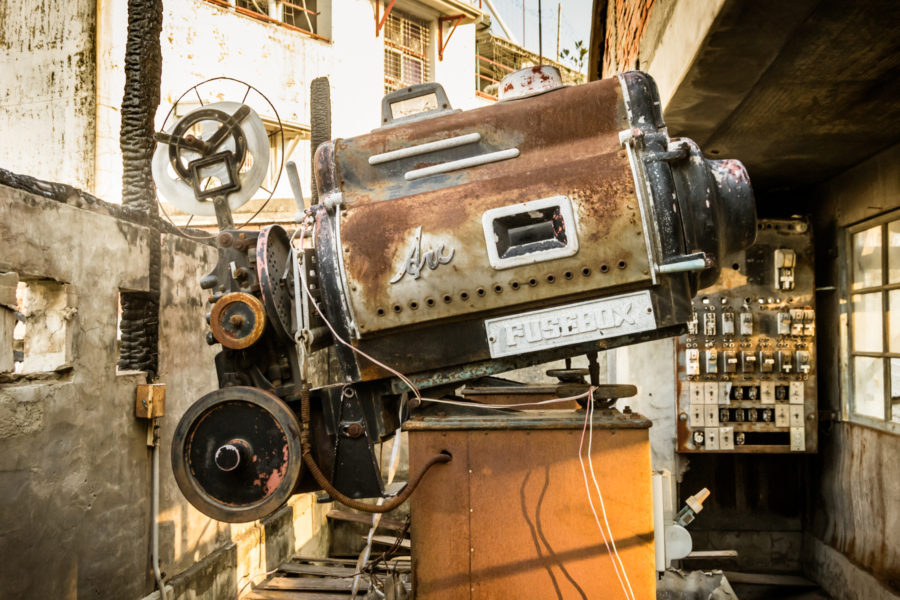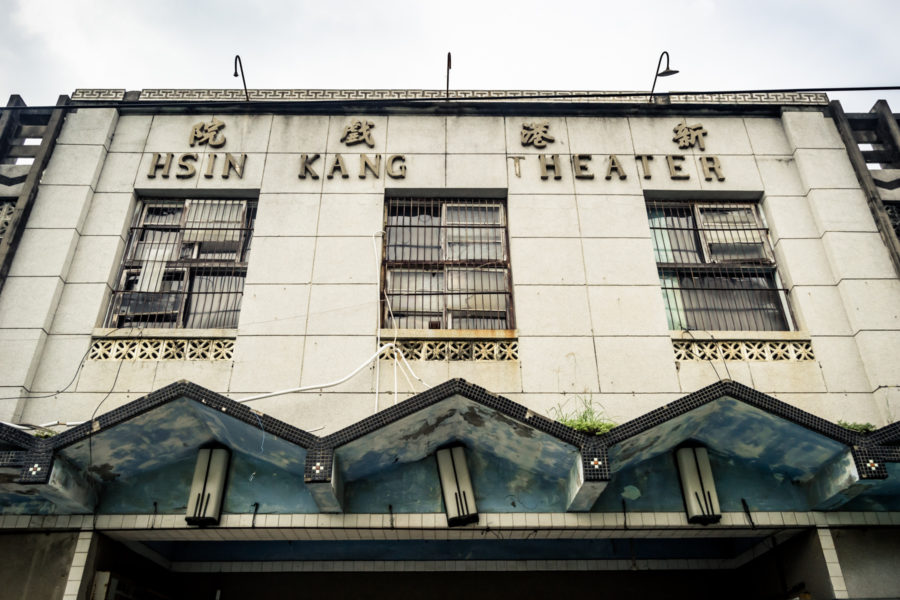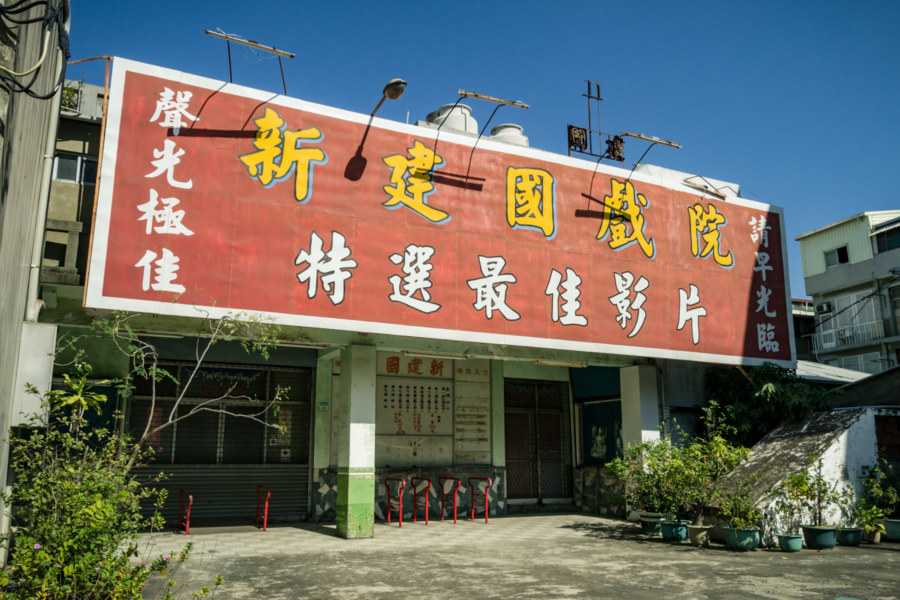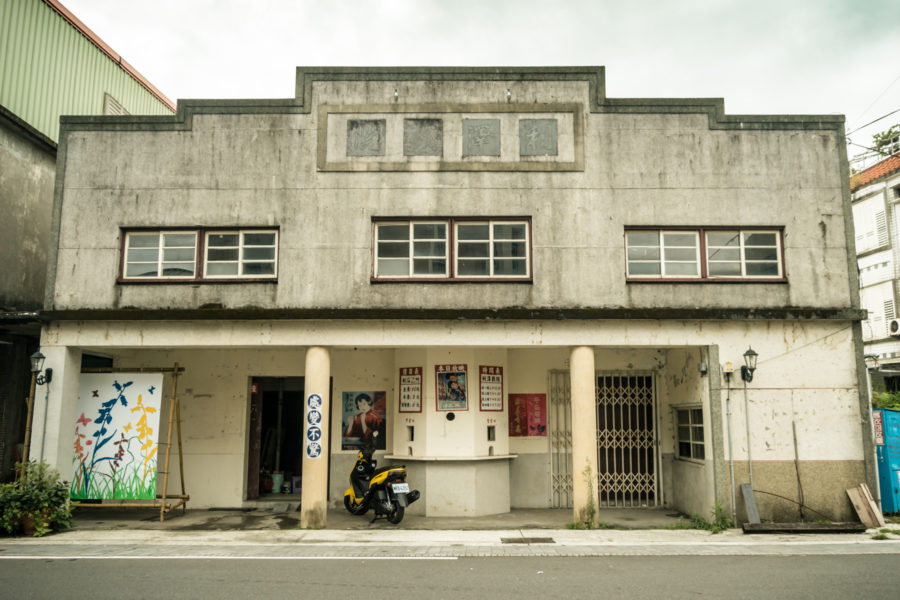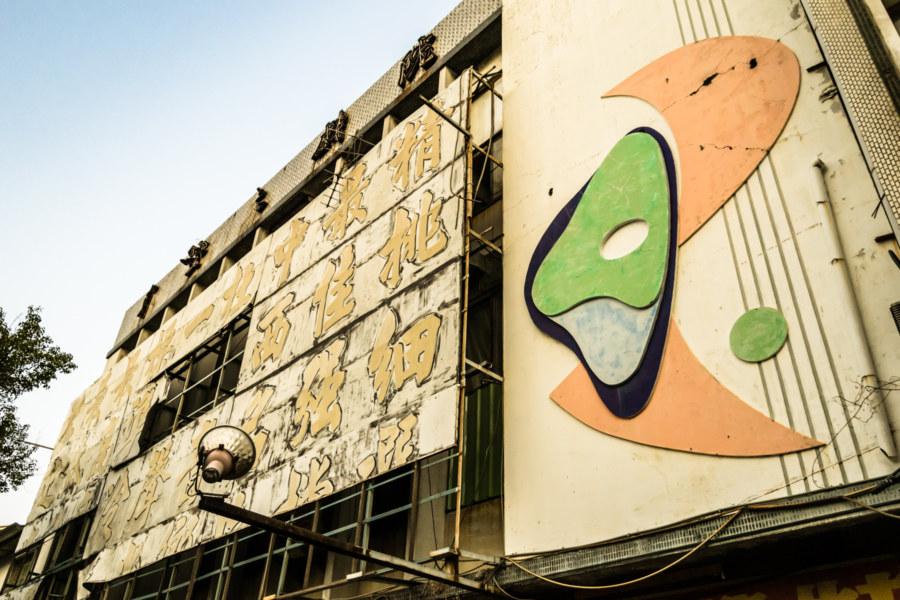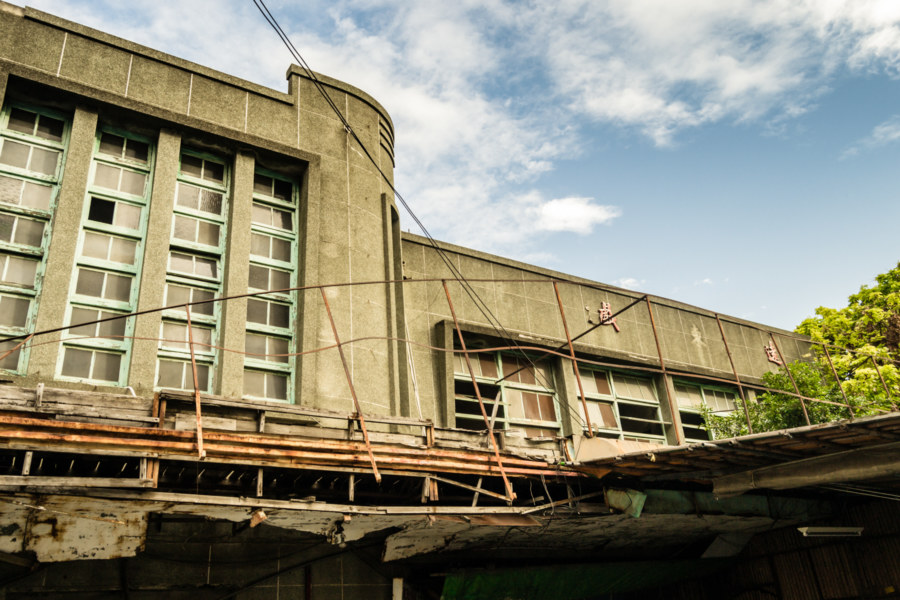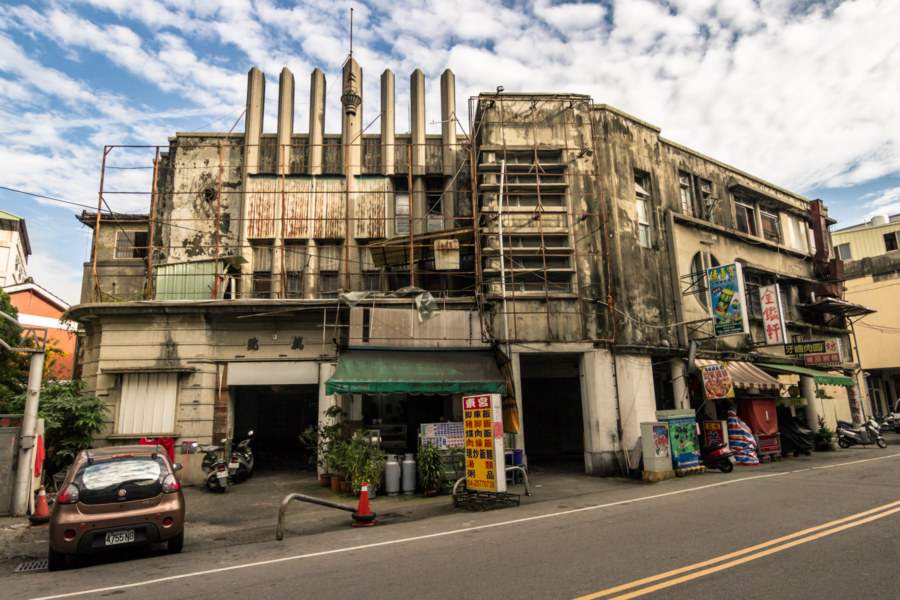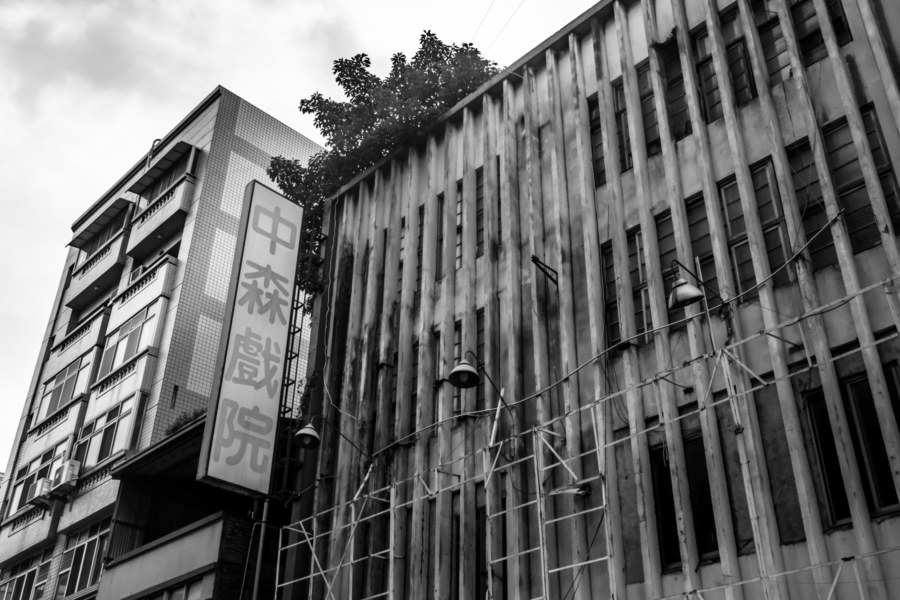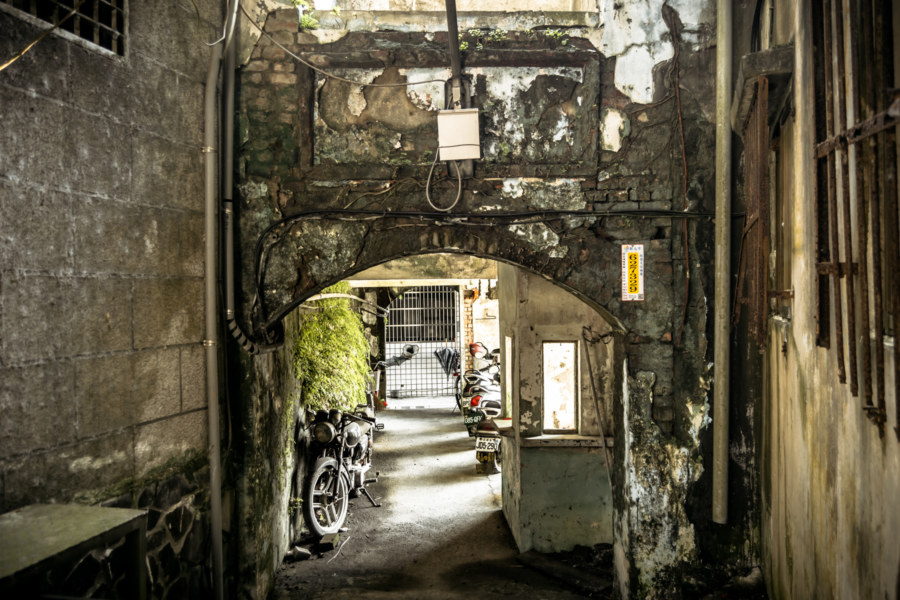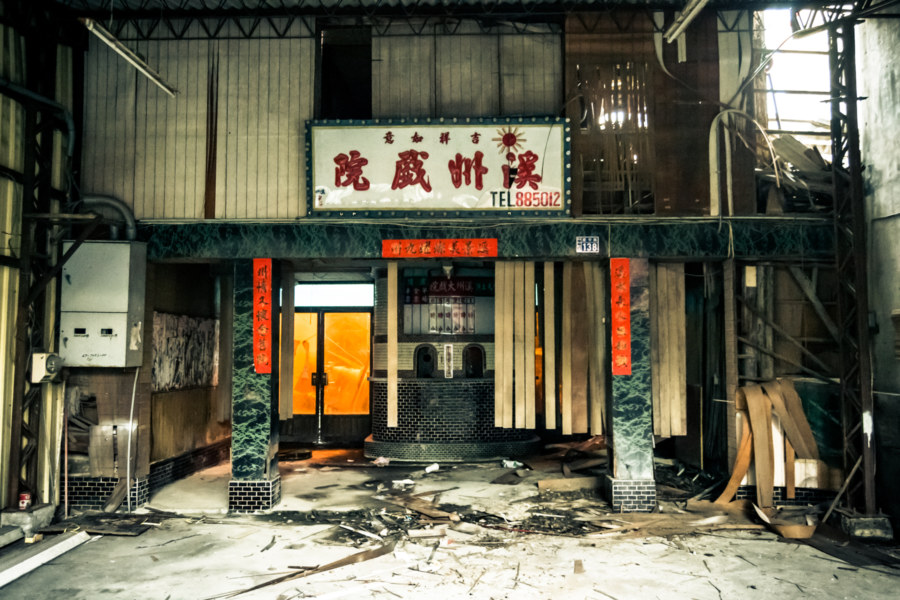Despite its relative obscurity Xinying is the largest settlement along the railway line between metropolitan Tainan City and Chiayi City. It was the capital of Tainan County prior to amalgamation in 2010 and remains the secondary administrative seat of Tainan. Located on the broad and fertile Chianan Plain, it was also an important transportation hub for the sugar industry, and what remains of the Japanese colonial era sugar factory can still be found on the south side of town. Xinying was also home to half a dozen standalone movie theaters in its heyday, but most have since been demolished. I was fortunate to visit the ruined KMT authoritarian era cinema Chénggōng Theater (成功戲院) in 2017, not long before it was completely destroyed.
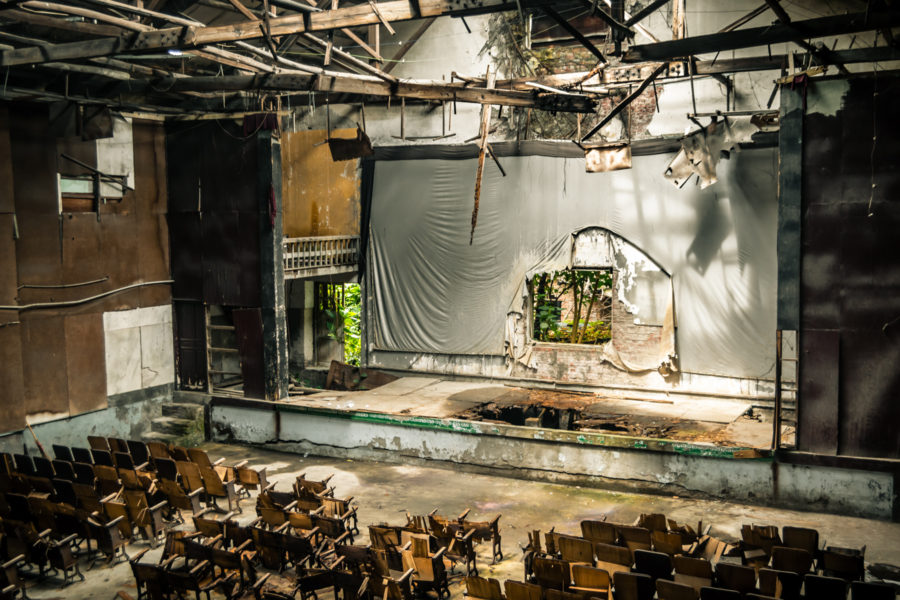
This ongoing project documents the many physical remnants and traces of the movie theater industry in Taiwan. The Taiwanese cinema industry blossomed in the late Japanese colonial era, exploded during the booming years of the Taiwan Economic Miracle, and went into sharp decline in the 1980s due to rising wages, the popularization of home video, and the development of modern cineplexes. Hundreds of traditional standalone theaters went out of business in recent decades, littering the urban landscapes of Taiwan with their derelict husks. Some effort has been undertaken to revive specific theaters but only a handful remain in operation. Delve into these archives to read more about theaters past and present, whether dilapidated and fallen into ruin or still clinging to life.
Hsin Kang Theater 新港戲院
Hsin Kang Theater 新港戲院 is located in the small town of Xingang, Chiayi, not far from the famous Fèngtiān Temple 奉天宮. Multiple sources agree it went out of business in 1988—a victim of shifting consumer preferences and demographic changes in small town Taiwan—but the actual age of the building is somewhat uncertain. This academic reference suggests it was founded in 1929, in the midst of the Japanese colonial era, but the theater was almost certainly renovated or completely rebuilt in the post-war period.
Tainan Xinjianguo Theater 台南新建國戲院
One of the last of the many vintage theaters of Tainan seems to have finally closed its doors. Founded in 1964, the notorious Xīnjiànguó Theater 新建國戲院 was originally named for its location on Jianguo Road 建國路, which was later renamed Mínquán Road 民權路. It is not uncommon for old theaters in Taiwan to resort to showing pornography in the twilight of their decline but this particular theater appears to have specialized in more carnal forms of entertainment for much of its history. Perhaps this is why this theater remained in business until very recently—long after most of the nation’s hundreds of other standalone theaters shut down in the late 1990s and early 2000s.
Lize Theater 利澤戲院
The obscure Lìzé Theater 利澤戲院 is located in the village of Lìzéjiǎn 利澤簡 in Wujie, a rural township just east of Luodong in Yilan, Taiwan. Built in 1964, it once served as a cinema and playhouse, hosting a variety of films and live theater performances for the local populace before slipping into decline in the 1980s, a little earlier than most other theaters I’ve visited around the nation. Afterwards the theater was converted for use as a clothing factory but this also went out of business. Nowadays the building is more disused than abandoned, as descendants of the original owner are still making use of the structure for storage and other purposes. In a stroke of good luck I happened to visit while the door was open—and after communicating my interest in the history of old theaters in Taiwan I was invited in for a brief chat and look around. Each theater has its own story to tell—but in this case I was particularly interested in learning why a theater was built in such a small and seemingly unimportant village.
Dong’an Theater 東安戲院
Recently I added yet another theater to my growing catalogue of old school cinemas in Taiwan: the derelict Dōng’ān Grand Theater 東安大戲院 in East Tainan. This theater opened in 1969 and closed its doors not long after the turn of the millennium, another victim of changing consumer habits. I wasn’t able to find a way inside this theater so this post only features a handful of exterior shots and some links I chanced upon after conducting preliminary research.
Beidou Yuandong Theater 北斗遠東戲院
Beidou is home to the historic Yuǎndōng Theater (遠東戲院, literally “Far East Theater”), originally built in 1955. Like most vintage theaters in Taiwan it struggled through the home video era and eventually shut down in the late 1990s. Unlike many other cinemas of its generation it does not appear to have been subdivided into smaller theaters prior to going out of business. It was, however, converted for use as a karaoke bar or gambling den at some point, judging by what I observed on a recent visit. As of 2015 the interior is used for nothing more than storage, particularly for a restaurant that has since colonized the area adjacent to the former ticket booth and entrance.
Donggong Theater 東宮戲院
Dōnggōng Theater 東宮戲院 is located in Dongshi, a Hakka majority township in mountainous central Taichung. Dongshi (or Tungshih in the older Wade–Giles Romanization system) is the gateway to the densely forested interior and was a major center of the lumber industry in Taiwan prior to its decline in the late 1970s and early 1980s. Disaster struck in 1999 with the devastating 921 Earthquake. Dongshi was among the worst hit; over 300 people lost their lives and hundreds of buildings collapsed—but not this grand old theater.
Zhongsen Theater 中森戲院
Taichung is changing fast. The historic downtown area, formerly one of the worst examples of inner city blight in the nation, is presently undergoing a massive urban renewal effort. Some decaying and disused commercial buildings have been restored, many more await their fate, and others have been demolished before I’ve even had a chance to document their interiors. Zhōngsēn Theater 中森戲院 belongs to this last category: it came down after I shot a preliminary set of photos but before I had a chance to sneak inside. You have to move fast to capture these small histories in their unmaking.
Shuangxi Donghe Theater 雙溪東和戲院
Dōnghé Theater 東和戲院 is an obscure ruin in Shuangxi, a former mining town of approximately 8,000 residents in the mountains of eastern New Taipei. Despite its diminutive size and relatively remote location, Shuangxi has a colorful history extending back to the late Qing dynasty era. Its prime location at the confluence of Mudan Creek and the eponymous Shuang River made it an ideal transshipment point for people and goods traveling to and from Ruifang. The surrounding hills also contained rich deposits of gold and coal deposits, sparking a mining boom that peaked in the mid-20th century with dozens of mines and more than 30,000 miners in the area. Two theaters were in business in the 1950s, but the local entertainment industries declined along with the mining industry, and only the ruins of Donghe Theater remain to provide a glimpse into the past. Although it isn’t formally protected, the site has been tidied up and anyone is welcome to wander in and take a look.
Xizhou Theater 溪州戲院
Some people are into urban exploration for the optics—they love visiting the most visually-impressive places and taking cool photos—but I’m just as interested in documenting history and solving puzzles. Animated by curiosity, I have become proficient in navigating the Chinese language web in search of leads. Not all of these turn out to be something interesting but I enjoy those rare days where I set out into the countryside and see how many candidate sites I can knock off my list. This is what originally brought me to the gates of the humble Xizhou Theater 溪州戲院 in the small town of Xizhou, Changhua.
